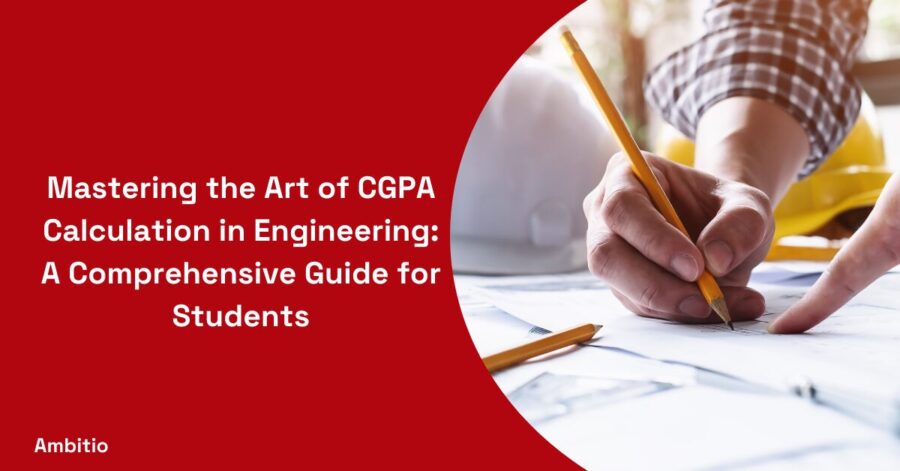13 December 2024
5 minutes read
Mastering the Art of CGPA Calculation in Engineering: A Comprehensive Guide for Students

The realm of engineering education is both challenging and rewarding, with the Cumulative Grade Point Average (CGPA) playing a pivotal role in a student’s academic journey.
This comprehensive guide aims to demystify the concept of CGPA, particularly for engineering students, and provide practical insights into its calculation, significance, and applications.
The ABCs of CGPA: Understanding its Foundation and Significance in Engineering
What is CGPA and Why Does It Matter for Engineering Students?
CGPA, or Cumulative Grade Point Average, is a universally recognized metric that quantifies a student’s academic performance in their engineering program. It represents the average of grade points earned across all completed courses or semesters.
In the context of engineering education, where the curriculum is rigorous and multidimensional, CGPA serves several key functions. Firstly, it provides a standardized measure of academic achievement, facilitating comparisons and evaluations.
Secondly, it’s a critical factor in determining eligibility for scholarships, internships, and placement opportunities. Moreover, a strong CGPA is often a prerequisite for pursuing higher studies, including postgraduate and doctoral programs.
Understanding one’s CGPA helps students identify their academic strengths and weaknesses, thereby guiding them in making informed decisions about course selections, study schedules, and career paths. It also instills a sense of academic responsibility and motivation, encouraging students to strive for excellence in their studies.
Demystifying the Calculation Process: A Closer Look at Credits and Grades
The calculation of CGPA in engineering hinges on two fundamental components: the credit system and the grading system. The credit system assigns a weightage to each course, reflective of its relative importance and time requirement. Courses with more contact hours or practical components usually carry more credits.
The grading system, on the other hand, assigns a numerical value (grade point) to the letter grades (A, B, C, etc.) earned in each course. These grade points typically range from 0 to 10 or 0 to 4, depending on the university’s policies.
To calculate CGPA, first, the grade points for each course are multiplied by the respective course credits. These values are then summed up and divided by the total number of credits attempted. The result is a weighted average that accurately reflects a student’s academic performance across all courses.
The Role of SGPA in the CGPA Calculation: Understanding Semester-wise Breakdown
From Semester Grades to Cumulative Excellence: Bridging SGPA and CGPA
SGPA (Semester Grade Point Average) is the stepping stone to understanding and computing your CGPA. It represents the average grade points earned in a single semester and provides a snapshot of a student’s academic performance during that specific period.
In the journey from SGPA to CGPA, each semester’s achievements contribute to the bigger picture of a student’s academic journey. To convert multiple SGPAs into a CGPA, one must calculate the average of these semester-wise grade points. This involves adding the SGPAs of all completed semesters and then dividing the sum by the number of semesters.
This process underscores the importance of consistent academic performance across semesters. A high SGPA in one semester can positively influence the overall CGPA, while a lower SGPA may necessitate more effort in subsequent semesters to maintain or improve the cumulative average.
Understanding the relationship between SGPA and CGPA is crucial for engineering students, as it helps in setting realistic academic goals, strategizing for improvement, and maintaining consistent performance throughout their engineering program.
Harnessing the Power of CGPA Calculators: Simplifying the Math for Engineering Students
Technology at Your Service: Making CGPA Calculation Effortless
In today’s digital age, CGPA calculators have emerged as indispensable tools for engineering students. These calculators, often available online or as mobile applications, are designed to automate the CGPA calculation process, making it more efficient and error-free.
A typical CGPA calculator for engineering students requires input such as individual course grades or SGPAs, along with the corresponding credits. The calculator then applies the appropriate formula, considering the university’s specific grading system, to yield the CGPA.
These calculators are particularly useful for students in universities like Anna University, where the grading system might have unique aspects. They eliminate the need for manual calculations, reduce the potential for errors, and save time, allowing students to focus more on learning and less on number crunching.
Moreover, many CGPA calculators offer additional features like projecting future CGPA based on hypothetical grades, thus aiding students in goal setting and academic planning. They also serve as a quick reference tool for understanding how different grades in upcoming courses might affect the overall CGPA.
Converting CGPA to Percentage: Bridging the Gap Between Different Grading Systems
From Relative Grading to Absolute Scores: Navigating the Conversion
For engineering students, especially those aiming for international education or employment opportunities, understanding how to convert their CGPA into a percentage is essential. This conversion is vital as different institutions and countries may use varying grading systems.
The process of converting CGPA to a percentage typically involves multiplying the CGPA with a standard conversion factor. However, this factor can vary depending on the university’s or country’s specific grading scale. For example, some institutions might use a factor of 9.5 (as in the case of some Indian universities), while others might have different multipliers.
This conversion is more than a mere mathematical exercise; it’s a bridge connecting different academic cultures and systems. It ensures that a student’s academic achievements are accurately and fairly represented, regardless of the grading system in place.
Students should be aware of the conversion norms of their respective universities and the requirements of the institutions or companies they are applying to.
In some cases, it’s also advisable to provide a brief explanation of the grading system along with the converted percentage, to offer a complete picture of one’s academic performance.
CGPA: Beyond the Numbers – Implications for Career and Higher Education
Leveraging CGPA for Career Advancement and Academic Pursuits
In the engineering domain, a good CGPA is more than just a number; it’s a testament to a student’s hard work, dedication, and academic prowess. It plays a significant role in shaping career prospects and higher education opportunities.
For job seekers, a high CGPA can be a decisive factor in securing competitive positions, especially in fields where technical expertise and academic excellence are highly valued. Employers often use CGPA as a criterion to shortlist candidates for interviews, internships, and entry-level positions.
In the realm of higher education, particularly for students aspiring to pursue master’s or doctoral programs, CGPA is a crucial component of the application process.
It’s often a determining factor for admissions, scholarships, and research opportunities. A strong CGPA can open doors to prestigious universities and enable students to specialize in their fields of interest.
However, it’s important to note that CGPA is not the sole determinant of success. Soft skills, practical experience, extracurricular activities, and personal projects also play a vital role in building a well-rounded profile. Engineering students should strive to balance academic achievements with these aspects to enhance their career and academic prospects.
Conclusion
Mastering the art of CGPA calculation and understanding its implications is crucial for engineering students. By leveraging tools like CGPA calculators, being aware of the conversion to percentage, and recognizing the impact of CGPA on career and higher education prospects, students can navigate their academic journey with confidence and success.
Frequently Asked Questions (FAQs) on CGPA in Engineering
Q1: Can a low CGPA be improved in subsequent semesters?
Yes, a low CGPA can be improved by securing higher grades in subsequent semesters. It requires a consistent effort and focus on academic performance.
Q2: How does academic probation relate to CGPA in engineering?
Academic probation is a status given to students whose CGPA falls below a certain threshold, set by the university. It serves as a warning to improve grades and is directly tied to CGPA.
Q3: Are there any tips for maintaining a high CGPA in engineering?
Maintaining a high CGPA requires regular study habits, understanding of key concepts, time management, and seeking help when needed. It’s also important to balance coursework with practical learning.

You can study at top universities worldwide!
Get expert tips and tricks to get into top universities with a free expert session.
Book Your Free 30-Minute Session Now! Book a call now




























